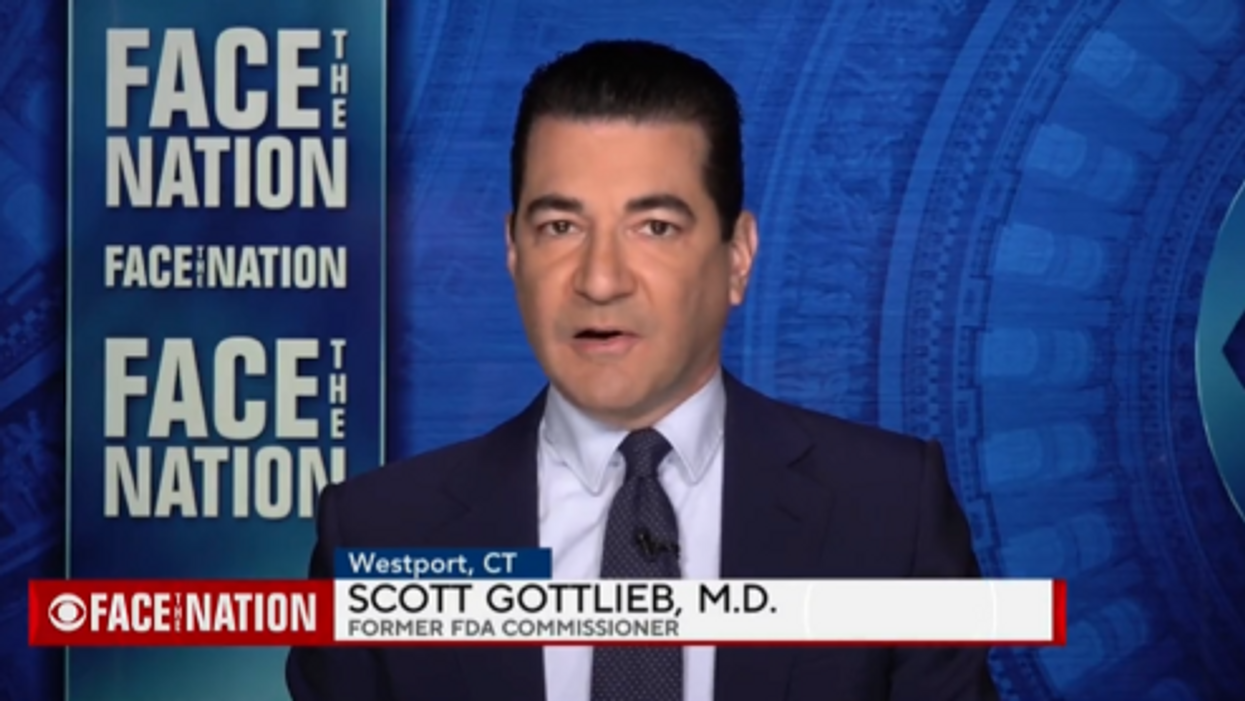
Image source: Twitter @FaceTheNation screenshot

Former Food and Drug Administration Commissioner Dr. Scott Gottlieb admitted that cloth masks do not provide a high level of protection against COVID-19. Gottlieb — who sits on the board of directors of Pfizer — delivered his insight on face masks as well as stating that the omicron is a milder variant during an appearance on "Face the Nation."
"Cloth masks aren't going to provide a lot of protection, that's the bottom line," Gottlieb told host Margaret Brennan on Sunday morning.
"This is an airborne illness," he continued. "We now understand that, and a cloth mask is not going to protect you from a virus that spreads through airborne transmission."
"It could protect better through droplet transmission, something like the flu, but not something like this coronavirus," explained Gottlieb, who was a clinical assistant professor at New York University School of Medicine before becoming the 23rd FDA commissioner in 2017.
At this stage of the pandemic, cloth masks don't provide much protection against COVID-19, according to @ScottGottliebMD.pic.twitter.com/pvX5McVnzX— Face The Nation (@Face The Nation) 1641139038
Last January, Gottlieb shared a CNN opinion piece titled: "America needs better masks to fight Covid-19."
Part of the reason is that new Covid-19 variants are more transmissible – meaning you are possibly more likely to be infected with even less exposure time and from greater distances than before. As Dr. Walensky herself mentions, ongoing studies are evaluating the efficacy of cloth masks in light of new variants. Without definitive answers, the precautionary principle – erring on the side of caution – should be invoked before more people become infected. Secondly, because -- regardless of variant -- the virus is still transmitted by both droplets and aerosols, the latter of which are best trapped by electrostatic charges found in N95 caliber masks.
In November 2020, Gottlieb wrote an op-ed in the Wall Street Journal titled: "Some Masks Will Protect You Better Than Others."
In the article, Gottlieb noted that at the beginning of the pandemic, health agencies advised the public to use cloth masks because "medical masks were in short supply."
"A cotton mask offers far less protection than a surgical mask," he wrote, adding, "An N95 or equivalent mask offers the best protection and, if used properly, will filter out at least 95% of infectious particles."
During Sunday's "Face the Nation" interview, Brennan asked Gottlieb if schools should mandate COVID-19 booster shots for 12- to 15-year-olds.
"Well, look, I certainly don't think schools should be mandating boosters," he replied. "I think this should be left up to the discretion of parents and their physicians."
"You know, it's going to depend on the individual circumstance," Gottlieb said. "What is the risk that the child's facing? Are they in a setting where they're more likely to come into contact with the infection? Do they have some underlying health conditions that put them at increased risk of bad outcomes?"
Gottlieb stressed that schools need to remain open.
"I think the imperative needs to be to try to open schools," he stated. "What you're saying by closing schools preemptively, and even colleges, is that you can't possibly control outbreaks in those settings. And I just don't think that that's the case. I think with the tools we have with prudence, with the knowledge we have about how to control this infection in those settings, you can do pretty- a pretty good job of trying to control large outbreaks, certainly within the classroom."
Gottlieb said the Omicron variant "does appear to be a milder strain of coronavirus and we also have a lot of immunity in the population."
"There is a very clear decoupling between cases at this point in hospitalizations and ICU admissions," he said. "There's a very clear, as I said, decoupling between cases and hospitalizations and does appear now based on a lot of experimental evidence that we've gotten just in the last two weeks, that this is a milder form of the coronavirus appears to be a more of an upper airway disease and a lower airway disease that's good for most Americans."
"The one group that- that may be a problem for his very young kids — very young children, toddlers who have trouble with upper airway infections, and you're in fact seeing more croup-like infections and bronchiolitis in New York City among children," he added. "So, that could be a challenge for young kids, and we are seeing rising hospitalizations among that pediatric segment."
Gottlieb believes that the current wave of the Omicron variant will begin to decline in most of the U.S. by the end of February.
"Now this is a big country, this will affect different parts of the country at different points in time," he said. "But if the UK is any guide, London's already peaking. If South Africa is any guide. This is about a two-month epidemic wave from start to finish. And so, parts of the country that were affected earlier, like New York, probably are going to start to peak in the next two weeks, other parts within the next four weeks. So, I think certainly by the end of February, we will be through this if businesses need a guide of when prevalence is going to start to decline in terms of school."
Last month, Gottlieb predicted that 2022 "is going to be a transition year." He said we will likely "go from a pandemic into a more endemic phase."
Gottlieb says Omicron appears to be a "milder form" of COVID-19, but pediatric danger remainswww.youtube.com